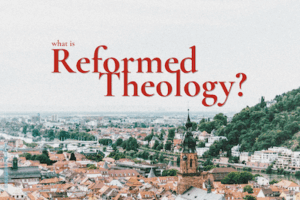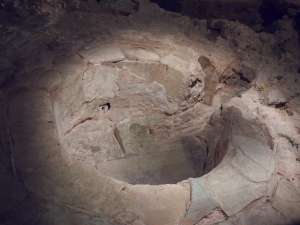There was a time when most of the world was outside the promises and people of God (Eph 2:12). From the formation of the national Israelite church under Moses, the world was, from the biblical perspective, divided between Jews and Gentiles. The temporary ceremonial and judicial laws, which were fulfilled by Christ and which expired with and were abrogated by his death (Acts 10 [all]), taught that not only certain foods were unclean (and illegal) and defiling but also that whole people groups were also unclean and defiling. Since the Lord instituted the sacrament of circumcision under Abraham (Gen 17:9–14) the Jewish church had been literally and figuratively cut off from the surrounding Gentile religions. Continue reading →
Defining “Reformed”
What Is Reformed Theology? (Part 6)
There are Christian traditions that speak of Jesus’ death as primarily an example and there are those that speak exclusively of Jesus’ death relative to his victory over death but the most basic choice we must make is whether he died as . . . Continue reading →
What Is Reformed Theology? (Part 5)
Since salvation belongs to God, it is he who grants us new life and true faith. As a consequence of the fall, all of Adam’s children (Rom 5:12–21) are, as Paul says, “dead in sins and trespasses” (Eph 2:1). The good news can be expressed in two words: “But God . . .” Continue reading →
What Is Reformed Theology? (Part 4)
Since salvation belongs to God, it is he who grants us new life and true faith. As a consequence of the fall, all of Adam’s children (Rom 5:12–21) are, as Paul says, “dead in sins and trespasses” (Eph 2:1). The good news can be expressed in two words: “But God . . .” Continue reading →
What Is Reformed Theology? (Part 3)
The Reformed confession is a catholic confession—that is, it is rooted in the Scriptures as interpreted by the church and confessed in the ancient, ecumenical creeds, but it is also a Reformation confession. Where the medieval church taught justification and salvation by . . . Continue reading →
What Is Reformed Theology? (Part 2)
Unfortunately, when most people think of Reformed theology, they think of the doctrine of predestination. The reasons for this have more to do with the critics of Reformed theology than with what the Reformed themselves confess. Indeed, one of the great weaknesses of the modern Reformed renaissance is that it tends to re-define Reformed theology almost entirely in terms of the doctrine of divine sovereignty. Continue reading →
What Is Reformed Theology? (Part 1)
Reformed theology has enjoyed a renaissance of sorts for about thirty years. A renaissance is literally a rebirth or, more broadly, a renewal. In order for there to be a renewal, however, there had to be a classical, defining period of Reformed . . . Continue reading →
Can Baptists Be Catholic? (Part 3)
My Baptist friends give two replies to the claim that they are not truly catholic. First, they appeal to their intent to be catholic. For example, in the introduction to the Second London Confession (1689) they say: “This we did the more abundantly to manifest our consent with both in all the fundamental articles of the Christian religion, as also with many others whose orthodox Confessions have been published to the world on the behalf of the Protestant in diverse nations and cities.” Continue reading →
Can Baptists Be Catholic? (Part 2)
When the ancient church began to use the adjective catholic (universal) to describe her theology, piety, and practice, and to distinguish herself from the Gnostic, Marcionite, and Montanist cults of the second century, the best evidence is that they did not read . . . Continue reading →
Can Baptists Be Catholic? (Part 1)
Whether Baptists can be catholic is a serious question that requires a serious answer. Before we proceed, however, we must define our terms. What is catholicity? Our English word catholic is really a Greek word, katholikos (καθολικός), borrowed by English. What does . . . Continue reading →
On Precisionism And Latitudinarianism (Again)
In 1520 Martin Luther published one of his most influential treatises, On the Babylonian Captivity of the Church. In it he attempted to set the church free from bondage to human opinion by unleashing again, as it were, God’s Word as the . . . Continue reading →
Do Reformed Christians Confess The Sabbath?
Justin Taylor has posted material from Tom Schreiner’s 40 Questions About Christians and Biblical Law, which argues, “I do not believe the Sabbath is required for believers now that the new covenant has arrived in the person of Jesus Christ.”1 Schreiner considers the . . . Continue reading →
Of Militants And Moderates
Darryl Hart (as always) has a provocative (in the best sense) article at Old Life.1 His use of the categories “militants” and “moderates” is very useful and helpful. To anticipate a criticism: yes, Reformed people can sometimes be jerks.2 Neither Darryl nor . . . Continue reading →
The Polish Reformed (1570) Rebuke The Anabaptists For Denying Infant Baptism
We also rebuke and reject all Anabaptists, who repeat their baptism and do not allow little children among God’s people to be baptized. James T. Dennison Jr. ed., Reformed Confessions of the 16th and 17th Centuries in English Translation: 1523–1693, vol. 3 . . . Continue reading →
Hungarian Synod (1567) Lumps The Anabaptists With Servetus And The Socinians For Denying Infant Baptism
We have decided, in accordance with the Word of God, that despite the howls of Servetus and the new Anabaptists, infants must be baptized together with adults, for the following reasons: 1. The matter of the sacrament, the covenant itself, righteousness, life, . . . Continue reading →
Antwerp Confession (1566): “I Reject The Error Of The Anabaptists” Who Detest The Baptism Of The Children Of Believers
I believe that baptism is the sign of the covenant of God with the seed of Abraham, ought to be given to those who belong to the covenant of grace, and, as a consequence, to the infants of believers. Thus I reject . . . Continue reading →
Second Helvetic Confession (1566): We Condemn The Anabaptists Who Deny Baptism To The Children Of Believers
We teach that baptism should not be ministered in the church by women or midwives. For Paul excludes women from ecclesiastical callings: but baptism belongs to ecclesiastical offices. We condemn the Anabaptists, who deny that young infants, born of faithful parents, are . . . Continue reading →
Beza (1561) At Poissy: “The Anabaptists Have No Stronger Enemies” Than The Reformed On Infant Baptism
I will not consider what concerns the administration of holy baptism, for I believe that none of us, sirs, wants to position ourselves among the Anabaptists, who have no stronger enemies than we. And concerning several other specific questions on this matter, . . . Continue reading →
Scots Confession (1560): “We Damn The Error Of The Anabaptists” For Refusing To Baptize The Children Of Believers
We confess and acknowledge that baptism appertains as well to the infants of the faithful as unto those that be of age and discretion. And so we damn the error of Anabaptists who deny baptism to appertain to children before they have . . . Continue reading →
Geneva Seminary Students (1551) Reject The “Ravings” Of The Anabaptists Against Infant Baptism
Moreover, although the sacraments are (given) to us for a pledge (arrabon), through which we are reassured of the promises of God, nevertheless I acknowledge that they will be useless to us unless the Holy Spirit should render them efficacious in us, . . . Continue reading →




